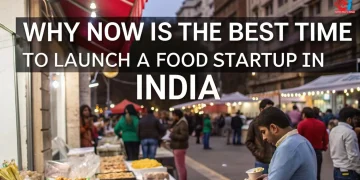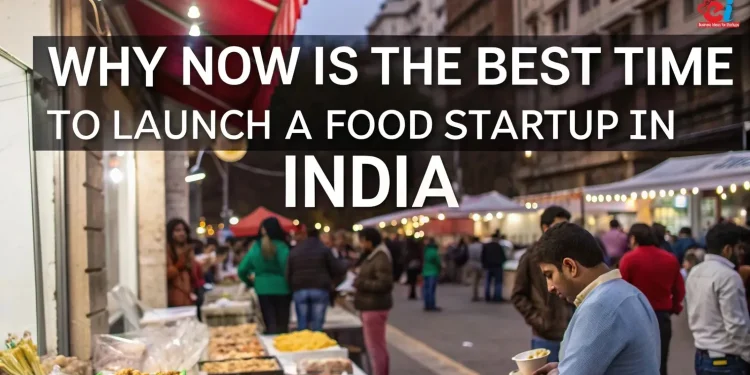India is on the verge of a change in the food and agribusiness industry. Because of high consumer demand, favorable government policies, a growing startup ecosystem, and a budding increase in new food startup, this is the perfect moment to introduce a food startup company in India. Processed foods and nutraceuticals – the value chain in India is diverse, and innovation is taking center stage.
We will explain how government strategies, market predictions, and emerging trends shape this moment into a grand opportunity for entrepreneurs to engage with the food processing industry. With guidance from government data from the Ministry of Food Processing Industries (MoFPI), forecasts and emerging trends, we hope to support every aspiring food entrepreneur for their own food startup with this essential guide.
Current Landscape of India’s Food Processing Sector
According to the MoFPI Annual Report 2023-24, like the agricultural sector which is growing at an average rate of 4.46%, the food processing sector, too, has been growing at an annual average rate of 5.35%. The sector accounts for 7.76% of India’s manufacturing GVA and 8.45% of the agricultural GVA at 2011-12 constant prices.
As one of the top producers of cereals, milk, fruits, and vegetables, India boasts great potential. Though, there is still room to improve in the percentage of food that gets processed.
Key Reason 2024–25 is The Ideal Time
Increased Demand From Consumers
Ready-to-eat food startup items are processed, organic, and functional foods and are in greater demand because of an expanding middle class, urbanization, and greater health consciousness among customers.
Government Schemes And Incentives
Supplementary schemes such as PMFME, PMKSY, and PLI grant seed capital, subsidized funding, provide financial aid, as well as training, infrastructure, and support.
Advancements In Technology
The advancements of automation, AI, IoT, and cold chain innovations have significantly improved the logistics of safety and product shelf-life.
Potential For Exports
There is enormous value and potential on an international scale with exports of processed food at $10.88 billion in 2023-24, which accounted for 23.4% of total agrifood exports.
Food-Tech And The Startup Ecosystem
Incubation centers NIFTEM and NABARD and others have led to the rise of food-tech startups which, along with private and government support, is booming in India.
Forecast: Growth, Demand, and Opportunities
India’s food processing market growth is expected to increase from $407 billion in 2023 to $535 billion by 2027, resulting in a CAGR of 6.5%.
Future Growth by Segment Projection (2023–27)
| Segment | CAGR | Key Drivers |
| Processed Fruits & Vegetables | 7.2% | Focus on health in cities |
| Frozen & RTE Foods | 12.5% | Time-strapped workers, ease of preparation |
| Functional Foods & Beverages | 15.3% | Immunity and wellness trends |
| Dairy Products | 9.1% | Value addition and retail formats |
Related: PMFME Scheme: A Game-Changer for Micro Food Enterprises in India
Government Push: Schemes Under MoFPI That Support Startups
1. PMFME (PM Formalization of Micro Food Processing Enterprises)
- A ₹10,000 Cr scheme dedicated to aiding 2 lakh micro units
- Provides financial aid to individuals, self-help groups, and farmer producer organizations (FPOs)
- Structured on the ODOP (One District One Product) principle
2. PMKSY (Pradhan Mantri Kisan Sampada Yojana)
- Provides support towards Mega Food Parks, cold chains, and food processing clusters
- Strengthens the construction of storage, processing, and logistics facilities
3. PLI Scheme For Food Processing
- Holds an allocation of ₹10,900 Cr for large food processing units in the country
- Targets RTE/RTH products, seafood, dairy, and organic commodities
Highlights from MoFPI Data (2023–24)
GVA (Gross Value Added) Contribution
| Year | GVA – Food Processing (₹ Lakh Cr) | Share in Manufacturing (%) |
| 2018-19 | 2.36 | 10.13% |
| 2022-23 | 1.92 | 7.66% |
Employment Creation
- Formal employment: 20.68 lakh
- Informal employment: 51.11 lakh
- Women: Over 12 lakh employed in food units
Export Trends
| Year | Processed Food Export (USD Bn) | Part of Agri-food Exports |
| 2022-23 | 13.08 | 25.6% |
| 2023-24 | 10.88 | 23.4% |
Related: Top 10 Government Schemes for Food Processing Startups in India
Key Emerging Startup Areas 2024–25
- Ethnic & Regional Foods – A global fascination with Indian cuisine
- Organic and Clean-Label Products – The mindful buyer
- Plant-Based & Dairy-Free – The emerging Vegan and lactose-free trends
- Functional Foods – Snacks and Immunity boosters using Ayurveda for holistic healing
- Supply Chain & Cold Chain Tech – Technology for traceability and preservation
Challenges for New Entrepreneurs
There are some challenges to consider, even though there are many opportunities:
- FSSAI, GST and State Licenses all have high regulatory complexity
- First generation and rural entrepreneurs face issues with credit access
- Infrastructure issues in tier 2 and 3 towns
✅ Through strategic partners and expert guidance these issues can be easily solved.
For more information check our related videos on Food Processing
How NPCS Helps Aspiring Entrepreneurs in the Food Sector
NPCS helps set up viable food processing units by providing significant aid, including:
- Conducting Market Surveys and Preparing Detailed Techno Economic Feasibility Reports
- Providing comprehensive information on the plant’s layout, required raw materials, processes, and financials
- Evaluating the strategic and economic feasibility of novel ideas for new businesses
NPCS has supported thousands of aspiring entrepreneurs across India to set up and grow their businesses.
Final Words – The Timing Couldn’t Be Better
Now is the best time to set up a food startup in India. With increasing domestic demand, booming exports together with a government push, and favorable global trends—India is poised like never before in 2024-25.
If it’s millet-based snacks, turmeric lattes or even frozen samosas, India is geared up with infrastructure and funding mechanisms and most importantly, consumer demand. India is ready. With authoritative suggestions from NPCS and profound planning, you can make it happen. The time to act is indeed now.


















